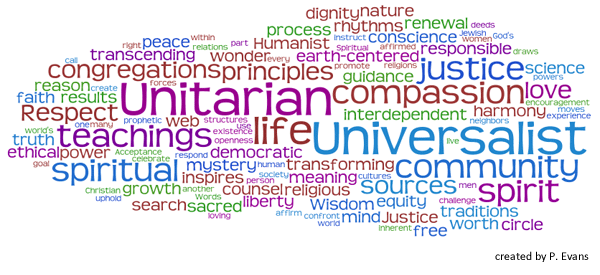

The Unitarian Universalist Association was born in 1961 when The American Unitarian Association (formed in 1825), and The Universalist Church of America (formed in 1793) joined.
Do Unitarian Universalists have a dogma?
No. While our religious movement is rooted in the Judeo-Christian heritage, we believe that creeds limit our spiritual vision. We continue to affirm the statement of Francis David, a 16th-century Unitarian leader, that "We need not think alike to love alike."
What do Unitarian Universalists believe about God?
Concepts of God vary widely among us. For some, God represents the Creative Process, the personification of the spiritual or the sense of unity in the universe. We affirm the right of individuals to believe about God whatever seems to them to be truest and most meaningful.
What to Unitarian Universalists believe about Jesus?
Traditionally we have found the life and ethics of Jesus to be of more value than the dogma that has accumulated about him. We accept Jesus as an important prophet and spiritual leader without denying the importance of other religious teachers. We affirm that the divine spark in Jesus is in us all.
What do Unitarian Universalists believe about the Bible?
We understand the Bible to be a collection of books ("biblia" means "little books") written by many authors over a period of 1,300 years. It represents a treasure of religious searchings for the meaning and purpose of life and God. We interpret the Bible symbolically rather than literally.
What do Unitarian Universalists believe about heaven and an afterlife?
Thoreau said it well for most of us: "One world at a time." We attempt to make the most of this life, this world. We do not offer celestial insurance and understand heaven to be a goal on earth when we can live in peace, with justice and freedom for all. We agree with the early Universalist minister John Murray, who said, "Give them not hell, but hope."
What do Unitarian Universalists believe about sin and salvation?
We understand sin in the Old Testament sense of "missing the mark." It is not living responsibly with ourselves, others and the universe. Salvation means becoming whole and reflects the process of fulfilling our human potential.
What is the purpose of the Unitarian Universalist church?
Our congregations provide understanding, support and food for the spirit. We look to one another for intellectual stimulation and emotional support, and to share in the celebration of what is spiritual and holy in life.
How are Unitarian Universalist churches organized?
Each of our 1,000 churches and fellowships operates under congregational polity, being democratic and autonomous. Our ministers are ordained and installed by the individual congregations after completing graduate-level theological training and receiving certification by the Unitarian Universalist Association of Congregations.
Frequently Asked Questions
Where does your name come from?
The word Unitarian, which came into use in 16th-century Transylvania, was a term used to designate a number of religious groups that pledged themselves not to persecute one another over differing beliefs, and that wished to emphasize the unity or oneness of the Supreme Being as distinct from the trinitarian formulation.
The word Universalist, also born in the post-Reformation world, defined those people who were opposed to the harsh doctrine that only the elect of mankind will be saved from eternal punishment. On the contrary, said they, salvation is universal for "the whole family of mankind."
